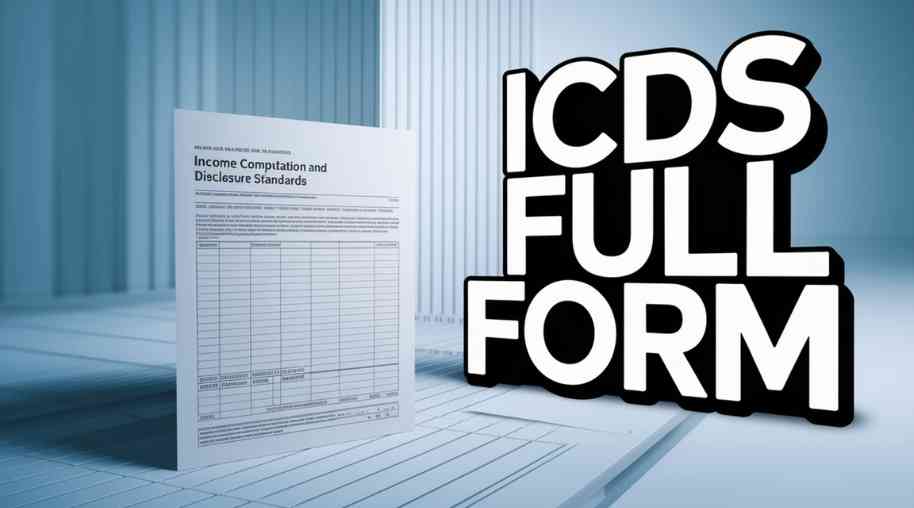ICDS Full Form-Income Computation and Disclosure Standards
by Shashi Gaherwar
0 2288
Income Computation and Disclosure Standards (ICDS): A Comprehensive Guide
**Income Computation and Disclosure Standards (ICDS)** were introduced by the Government of India to standardize accounting practices for tax computation. These standards aim to ensure **consistency**, reduce **disputes**, and provide **clarity** in financial reporting for businesses and individuals under the **Income Tax Act, 1961**. This article explores the purpose, scope, applicability, key provisions, and implications of ICDS in the Indian taxation system.

What are Income Computation and Disclosure Standards (ICDS)?
ICDS are a set of accounting standards notified under **Section 145 of the Income Tax Act, 1961**, applicable for the computation of taxable income under the heads **“Profits and Gains from Business or Professionâ€** and **“Income from Other Sourcesâ€**. They are based on existing **Indian Accounting Standards (AS)** but focus solely on **taxation** rather than financial reporting.
Objectives of ICDS
The key objectives of ICDS include:
- Standardization of Accounting Policies: Ensures uniformity in **tax computation** across different businesses and sectors.
- Reduction in Litigation: Minimizes disputes between **taxpayers** and **tax authorities**.
- Clarification of Ambiguities: Addresses areas where **accounting principles** and **tax laws** may conflict.
- Better Compliance: Aligns tax reporting with **global best practices** while maintaining national tax laws.
- Facilitation of Tax Administration: Helps **tax authorities** verify financial records efficiently.
Pro Tip: ICDS simplifies tax computation by providing clear guidelines for complex accounting scenarios.
Applicability of ICDS
ICDS applies to:
- All taxpayers following the **mercantile system of accounting** for tax purposes.
- Businesses and professionals whose turnover exceeds **₹50 lakh**.
- **Companies**, **partnerships**, **individuals**, and **Hindu Undivided Families (HUFs)** subject to tax audit under **Section 44AB** of the Income Tax Act.
Key ICDS and Their Provisions
Currently, there are **10 ICDS**, covering various aspects of income computation and disclosure:
- ICDS I – Accounting Policies: Requires **consistency** in accounting methods and does not recognize the concept of **prudence** in taxation.
- ICDS II – Valuation of Inventories: Valuation should follow the **cost** or **net realizable value (NRV)** method, whichever is lower.
- ICDS III – Construction Contracts: Revenue recognition must follow the **percentage-of-completion method**.
- ICDS IV – Revenue Recognition: Income should be recognized on an **accrual basis** unless otherwise stated.
- ICDS V – Tangible Fixed Assets: Defines how to **capitalize**, **record**, and **depreciate** fixed assets.
- ICDS VI – Effects of Changes in Foreign Exchange Rates: Governs the treatment of **foreign currency transactions** and **translation**.
- ICDS VII – Government Grants: Specifies conditions under which **government grants** should be recognized as income.
- ICDS VIII – Securities: Regulates **valuation of securities** held as stock-in-trade.
- ICDS IX – Borrowing Costs: Defines when **interest costs** should be capitalized or expensed.
- ICDS X – Provisions, Contingent Liabilities, and Contingent Assets: Establishes when and how to recognize **provisions** and **liabilities**.
Key Differences Between ICDS and Accounting Standards (AS)
ICDS differs from **Accounting Standards (AS)** in several ways:
- Focus: ICDS is for **tax computation**, whereas AS is for **financial reporting**.
- Prudence Concept: Unlike AS, ICDS does not allow recognition of **anticipated losses**.
- Inventory Valuation: ICDS mandates a strict **cost or NRV** rule without adjustments for expected losses.
- Revenue Recognition: ICDS mandates recognition based on **accrual**, while AS allows discretion in some cases.
Implications of ICDS
ICDS has several implications for taxpayers:
- Higher Taxable Income: Since ICDS does not recognize prudence, businesses may report **higher taxable income**.
- Compliance Burden: Taxpayers must maintain **additional records** to comply with ICDS.
- Increased Litigation Risks: Differences between ICDS and AS may lead to **disputes** with tax authorities.
- Clarity in Tax Computation: Offers better guidance in specific **accounting areas** for tax purposes.
- Impact on Financial Statements: Companies may need to **reconcile** their financial statements with tax records.
Challenges in Implementing ICDS
ICDS implementation faces several **challenges**:
- Conflict with Existing Accounting Standards: Differences between ICDS and **AS/Ind AS** create **reconciliation difficulties**.
- Additional Compliance Effort: Businesses need to maintain **dual records** for financial and tax purposes.
- Litigation and Disputes: Ambiguities in ICDS provisions may lead to **interpretation issues**.
- Adaptation for Small Businesses: Many **small taxpayers** struggle to implement ICDS due to a lack of resources.
**Income Computation and Disclosure Standards (ICDS)** play a crucial role in **streamlining tax computation**, **reducing disputes**, and **improving compliance** in India. While they simplify certain aspects of taxation, they also impose **additional compliance requirements**. Businesses and professionals must stay informed about these standards to ensure proper **tax planning** and minimize risks. As taxation evolves, future amendments to ICDS may further align it with **global financial reporting practices** while addressing current challenges. Understanding ICDS is essential for businesses, accountants, and tax professionals to navigate India’s **complex tax landscape** effectively.
Further Learning Resources
If you’re passionate about building a successful blogging website, check out this helpful guide at Coding Tag – How to Start a Successful Blog. It offers practical steps and expert tips to kickstart your blogging journey!
For dedicated UPSC exam preparation, we highly recommend visiting www.iasmania.com. It offers well-structured resources, current affairs, and subject-wise notes tailored specifically for aspirants. Start your journey today!

Share:









Comments
Waiting for your comments